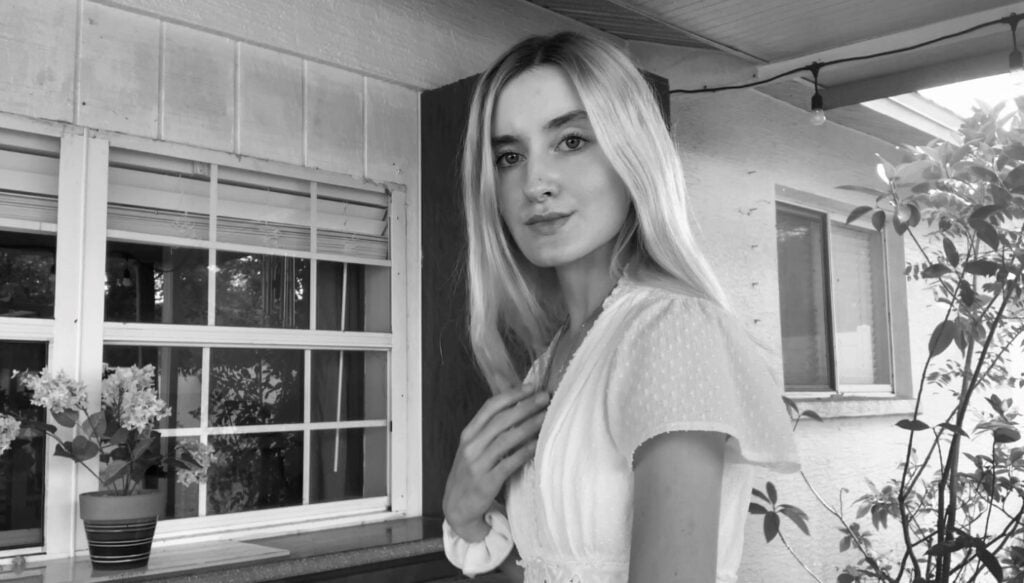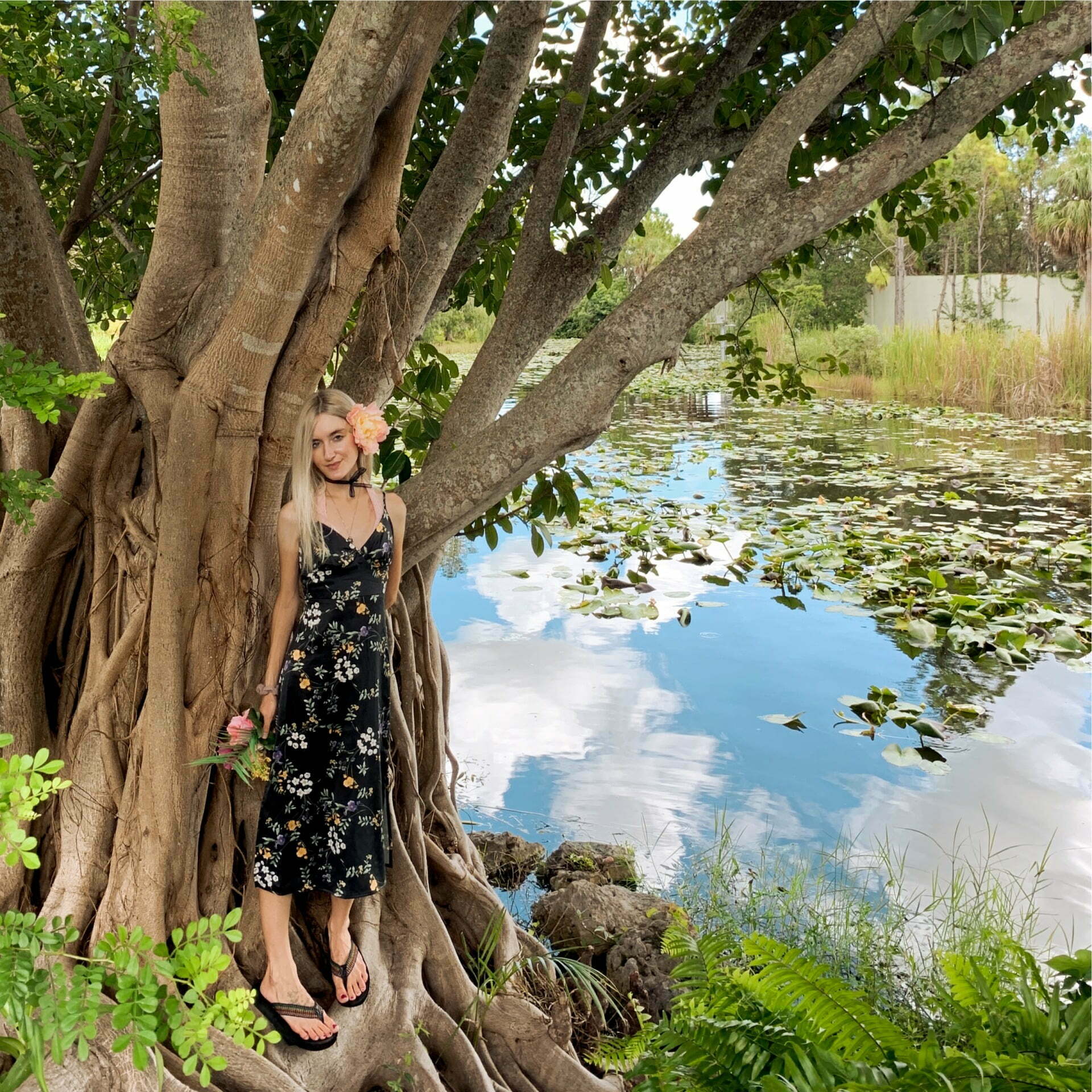KIMMERLY is an American singer-songwriter, multi-instrumentalist, and producer who was born Carson Ruby Kimmerly. Her references to pieces like the “Mona Lisa” and artists like Degas demonstrate that she draws her inspiration primarily from the history of art. The release of her most well-known song, “Waterlily,” in late June, which was influenced by the paintings of Claude Monet, signaled the start of her ascent. By experimenting with a variety of sounds and tying them together with common instruments and universal themes, KIMMERLY blurs the lines between genres.
Her first EP, Of Muses and Music (Volume One), features her first single, “Waterlily.” All of the songs were influenced by European works of art from the Impressionism and Post-Impressionism periods. Famous sources of inspiration include Van Gogh’s “Starry Night” and Claude Monet’s “Water Lilies” series. The EP has received over 20,000 streams on Spotify so far, which is a great response. Check out the EP and the exclusive interview below:

1. Can you tell us a bit about where you come from and how you got started?
KIMMERLY: I have a very average background all things considered. I believe that my love and affinity for art and music are something I was born with. I was blessed to come from a city where music and art were highly valued in my school system from a young age, and I definitely took advantage of that. I decided at about age fifteen that I wanted to be a musician, and I’ve been looking forward ever since.
2. Did you have any formal training or are you self-taught?
KIMMERLY: Actually, a bit of both. I began classical training on the violin when I was in sixth grade, and that was ultimately what sparked my aspirations for a music career. I learned how to play the violin at a professional level and got an in depth education in music theory and composition in the process. Interestingly enough, I actually went on to teach violin lessons for a while after graduating, but I found it wasn’t a good fit for me. I went on to teach myself the guitar, piano, and music production using the baseline I had from my classical background.
3. Who were your first and strongest musical influences and why the name ‘KIMMERLY’?
KIMMERLY: My musical influences are spread across a number of areas – some of them not even musical. My instrumentals are highly influenced by styles present in classical music. My lyrics and vocals are in the genre of alternative/singer-songwriter. Some of my favorite artists, such as Fiona Apple, pushed me to focus on being a good lyricist. In general, though, I would say I get most of my ideas from my favorite works of visual art – as seen by my songs ‘Mona Lisa’ and ‘Waterlily’, for example. As for the name KIMMERLY, it’s simply a stylized version of my last name. I spent years stressing over a perfect name to attach to my sound. I ultimately decided on KIMMERLY, thinking it was the perfect blend of personal and anonymous.
4. What do you feel are the key elements in your music that should resonate with listeners, and how would you personally describe your sound?
KIMMERLY: I think the key element of my music that should resonate with listeners is my acoustic approach. I use my acoustic violin and guitar as the background in all of my tracks (sometimes piano, too). Even though the background instrumentals aren’t meant to be the main focus of the music, I think that the use of acoustic instruments brings so much more to a track than synthesizers ever can. I would describe my sound as acoustic alternative art-pop. Sometimes there are elements of other genres, like folk or even hip-hop influences, but common instruments and themes are present in all my tracks.

KIMMERLY:
I definitely went through a number of phases in my music making that have led me to where I am today. I experimented with many different sounds that were more synthetic or ‘poppy’ in nature, but it didn’t feel right. I wanted to be known as a serious musician, so I decided to use my real instruments in all of my songs. So, at the end of the day, I think my sound was born simply out of the resources I had available to me – being a violin and an acoustic guitar. I wouldn’t say that I am at all rigid about remaining in the ‘folk’ genre. I play around with whatever influences are convenient at the time.
6. What’s your view on the role and function of music as political, cultural, spiritual, and/or social vehicles – and do you try and affront any of these themes in your work, or are you purely interested in music as an expression of technical artistry, personal narrative and entertainment?
KIMMERLY:
For me, music is mainly an expression of the finer details of life. Most of my songs truly are a diary of my own feelings and experiences, often wrapped up in expressions or metaphors. I really don’t want to let my music get political – but I will let myself bleed over the lines of cultural and spiritual commentary. Clearly culture plays a huge role in my creative process, mainly art culture. My music is art. It is there for entertainment and admiration, for me to get things off of my chest, and to make listeners use their minds – it is never a stab at anyone or anything in particular and is not meant to be taken as such.
7. Do you feel that your music is giving you back just as much fulfilment as the amount of work you are putting into it, or are you expecting something more, or different in the future?
KIMMERLY:
My music isn’t giving me as much as I hope it ultimately will, but I do feel that the return has been proportional to my effort. The more energy I put into making opportunities for myself, the more I have gotten in return. You can’t reap what you don’t sow, and right now I’m still very much in the sowing process. I don’t know what’s to come in the future, but I believe I will find fulfillment through music in time.
8. Could you describe your creative processes? How do you usually start, and go about shaping ideas into a completed song? Do you usually start with a tune, a beat, or a narrative in your head? And do you collaborate with others in this process?
KIMMERLY:
As I’ve described to a few other publications, my creative process is a little unconventional. The lyrics usually come first. I’d say I fill multiple pages with lyrics everyday, many of which never see the light at the end of the tunnel. I type them out, write them by hand, or record them in voice memos – while I’m driving is often a prime time for lyrical creativity. I’m usually not as excited about production, so when I’m in the mood I’ll record and mix a track all in one day. And as terrible as it sounds, I really don’t care much for collaboration. I am very personal and guarded with my music. Nobody hears it until it is done; and even then I prefer the idea of strangers enjoying my work over my own loved ones. It has always been a quirk I hope I’ll get over one day. I would like to work with other musicians and industry insiders more in the future.
9. What has been the most difficult thing you’ve had to endure in your life or music career so far?
KIMMERLY: I’ve gone through some very difficult personal turmoils even in my young life (that I may or may never discuss publicly, but will always bare between the lines of my songs). I will say, however, that the most difficult part of my musical career was deciding how to brand myself. Choosing a name and an image for myself that set me apart but didn’t put me in too small of a box was a struggle.
10. On the contrary, what would you consider a successful, proud or significant point in your life or music career so far?
KIMMERLY: I am proud of all of the work I do for my music – probably too proud sometimes. I feel confident in my abilities to write lyrics and compose music and make instruments sound how I want. It has taken me years to obtain the skills I possess (especially on the violin) and I think that is something to be proud of. But, mostly I am proud of myself for my persistence. I am the type of person who gets bored easily, but being a musician is a goal I’ve never given up on – and that’s how I know it’s the right path for me.
KEEP IN TOUCH:

